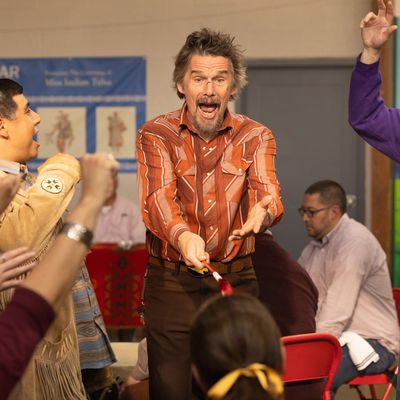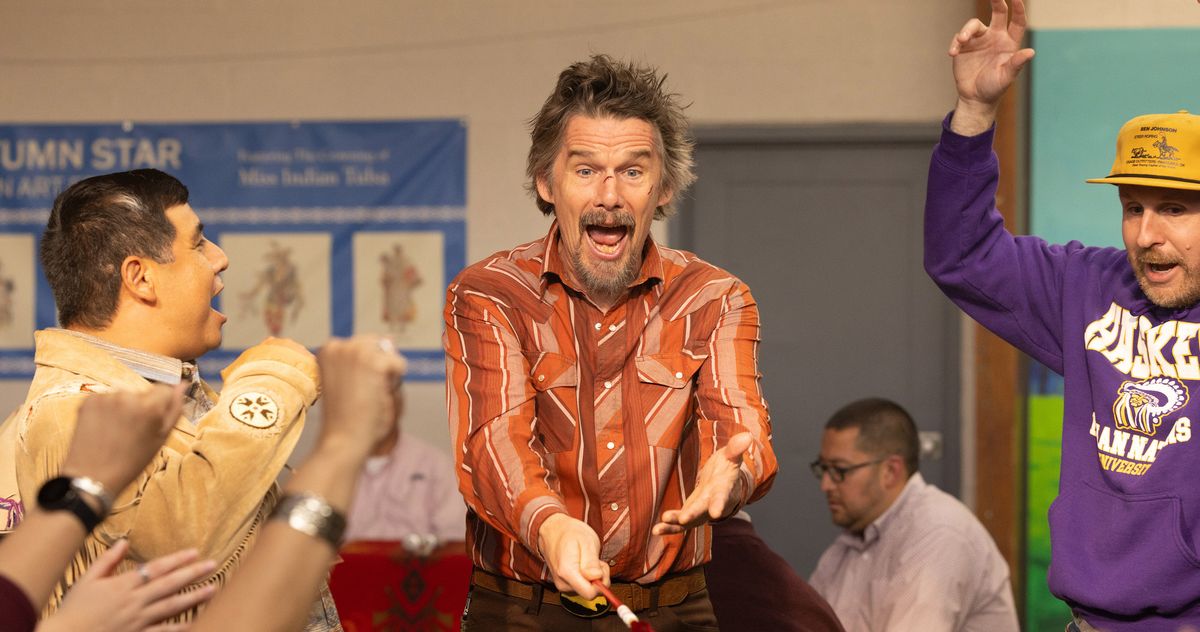
Old Indian Trick
Season 1
Episode 6
Editor’s Rating
3 stars
***
Photo: FX
A few episodes back, Betty Jo assured Lee that even if Dale and Donald Washberg were fighting about land, the fight between them wasn’t really about land — it was about Betty Jo, it was about Pearl, it was about the humiliating ways a family’s golden boy can diminish his black-sheep little brother. Even last week, when we learned that Indian Head Hills was at the center of a preposterous real-estate deal that would catapult the cash-poor Washbergs into the black, I believed Betty Jo was telling Lee the truth, as far as she knew it.
How I squealed when, in the closing moments of “Old Indian Trick,” Betty Jo reveals herself to be as cunning as the men around her. On the heels of a phone call from loose-lipped Lee “alerting” Betty Jo to a secret version of Dale’s will that would disinherit her and Donald, she calls Frank Martin, her dead husband’s brother’s dodgy business associate. This is not a shock response to suddenly finding out that you and your daughter have been left out in the cold. This is a woman making the calculated choice to switch to plan B — to ally herself with a powerful player, one with a lot to lose.
Despite the episode’s big reveals — and there are more than just the existence of a second will — “Old Indian Trick” doesn’t hum with the same frenzied energy as The Lowdown’s previous installments, which relied on playful antagonism between Lee and whomever he’s roped into helping him. This week, though, Lee enlists Deidra, a bookshop employee whose only real problem with Lee is that he’s low-key uncool. Their tour of Indian Tulsa includes the Indian store, where Lee buys an ill-fitting suede fringe coat from a welcoming salesperson, and the Indian community center, where, sure, he gets called “Custer,” but in a harmless way. Lee’s so uncomfortable with his own whiteness in these contexts that he stops being his pushy, nosy, relentless self. The end result is that no one dislikes him, and Lee’s day passes without much friction, which doesn’t make for blistering TV.
It’s Donald who takes the far wilder ride this week. After dragging Lee to the cookout from hell at the end of the last episode, he lets the Tulsa truthstorian go free after delivering a black eye (for sleeping with his girl, Betty Jo) and a threat (if you don’t leave my family alone, these cops in my pocket might find you in a ditch somewhere). But in trying to dissuade Lee from further investigating Dale’s death, he lets slip a new lead. According to Donald, Dale killed himself because — bear with me here — he was in the thrall of a gay Native American “street person” artist. But even if Lee hadn’t recently been handed a sketch of Dale by a stranger who meets Donald’s exact description, he would never have heeded the warning. Warnings are like fuel to a guy like Lee, who can’t wait to go home and add the words “Mystery Indian. Maybe gay?” to his murder board with a piece of string and a pushpin.
Still, the Lee situation is handled, as far as Donald is concerned. He heads back out on the campaign trail, with Marty now serving as both chauffeur and security detail. Their first whistle stop is at a podunk church called “One Well,” which shares its name with the LLC offering the Washbergs a ginormous sum for Indian Head Hills. Donald doesn’t realize the connection; in fact, he’s barely suspicious when it becomes clear Pastor Mark — played by Oklahoma’s own Paul Sparks — hasn’t invited any parishioners to this meet and greet. Marty’s first act as head of security is to allow the candidate to climb into the flockless pastor’s camo-festooned side-by-side, never mind the rifle mounted just below the vehicle’s roll bar.
Mark insists on giving Donald a menacing tour of the One Well compound, which actually overlooks Indian Head Hills. Twist! Mark is the mysterious buyer who’s been losing patience with the Washbergs, and the money he’s offering Donald isn’t a bribe. Well, it’s not only a bribe. Mark really needs the parcel of land to support his congregation of recently paroled skinheads — men like Allen, who can help the brotherhood wrest control back from the tribes. He’s building a homeland for militant, racist lunatics on the very same parcel that made the Washbergs kings of Oklahoma in the first place. In doing so, he’ll funnel money into Donald’s campaign and restore the Washbergs to the top of the Oklahoma food chain. A vote for Washberg is a vote for whites.
Later in the episode, Frank shows up at the church to shout down Mark for having the nerve to contact Donald directly. Donald is now having second thoughts about the deal, though in reality, he didn’t seem sold on the “too good to be true” deal when Frank asked him about it last week. Like Donald, Frank doesn’t seem to understand that the game has changed. Mark drags Frank out to the hole where he buries the bodies of men who break covenant with the One Well army — men like Blackie, Berta, and Allen. He does it with his highly armed flock surrounding him, including Jimmy, who murdered Allen in broad daylight. Mark isn’t asking to buy the land anymore.
Flustered and afraid, Frank runs home to call his “46” buddy, Trip, to kill the deal with this “unhinged” pastor, but Trip is the one bankrolling Mark’s whole operation. “We are at war in this country,” Trip reminds Frank, who seems like a JV racist accidentally called up to a team of true believers. If he doesn’t end up at the bottom of Mark’s “stankhole,” I’ll be shocked. Mark needs Trip’s money, and he needs Donald’s deed, but what use to him is a middleman who can’t line things up?
Meanwhile, Lee spends the day on a field trip through Tulsa hotspots where white people are welcome but not exactly invited: the Indian store, the Indian community center, and, eventually, an Indian housing project. He’s searching for Chutto, the man who Donald believes influenced Dale’s suicide. It’s Deidra who gives Lee the name he’s looking for — Chutto is well-known enough in Tulsa, at least in Indian circles. They sell his pictures at the Indian store. But Lee doesn’t want to turn up at the Indian store looking like a white guy shopping for moccasins. So he pays Deidra time and a half to accompany him, which makes him look like a white guy with a cultural tour guide.
It would have been more cost-effective for Lee to have sent Deidra to do the investigation on her own. He’s busy playing handgame at the Indian center while Deidra works the room, eventually learning that Chutto lives at an apartment complex called Whispering Pines. When Lee knocks, it’s Chutto’s grandpa, Arthur, who answers the door. (The role was played by Graham Greene, perhaps the most recognizable First Nations actor in Hollywood, shortly before his death.) Maybe because Arthur is suffering from dementia, or maybe because all white people look alike, especially the scruffy ones in boots, Arthur mistakes Lee for Dale, who he knows to be dead. In his state, though, Arthur easily doubts what he knows. Maybe this is Dale. Maybe his grandson was wrong when he told him Dale was killed.
Lee’s just starting to pump Arthur for intel about how he knows Dale when Chutto (Mato Wayuhi) comes home. He chucks Lee out of the house — an aggressive move considering Chutto sought Lee out in the first place. As the men regroup on the front porch, though, Chutto explains that he met Dale outside a gay nightclub where he was drawing portraits. Dale never worked up the nerve to enter the club, but he did ask Chutto to draw him. It’s the first time on The Lowdown that we’ve seen a flashback of Dale that isn’t authored by Dale. In Chutto’s eyes, Dale is just as peculiar, but less forthright. More quiet.
They became friends, sort of. Really, in the end, Dale turned out to have more in common with Arthur. The older men would play board games and talk about the good old days, back when Oklahoma was nothing but ranchland. Eventually, Arthur revealed to Dale that they share more than their nostalgic streak. By extreme coincidence, the Indian Head Hills parcel that became the cornerstone of the Washbergs’ fortune once belonged to Arthur’s family. Twist! Nathaniel Washberg killed Chutto’s grandfather’s grandfather and used the dead man’s thumb to posthumously “sign” the deed over to himself. Moved by Arthur’s story of dispossession, Dale wrote out a new will, which would see his shares of Indian Head Hills returned to Arthur and Chutto. Before his death, Dale asked Arthur to hold on to it and that’s where the secret will remains now: tucked away in the old man’s drawer.
Lee can’t believe what these men are sitting on. His advice is to lawyer up. But Chutto only sees trouble in the will, which would surely be contested by Donald. Maybe by Betty Jo, too. Dale wasn’t trying to tear apart his family — he wanted a way out of his white guilt. These, I suppose, are the “ideas” Donald claims Chutto put in Dale’s head. But if Donald already knows about Dale’s moral reckoning over the land at Indian Head Hills, then it’s likely word of it reached Betty Jo, too.
“I’m on the run,” Betty Jo tells the Sunyata receptionist at check-in early in the episode. Sunyata is the bougie, cultish wellness retreat Lee suggests for Betty Jo’s hideaway — a place where Donald Washberg and his goons on the police force can’t find her. “Man’s trying to kill me,” adds Betty Jo, dressed like she’s just stepped out of a Ralph Lauren catalogue. The receptionist is skeptical, but I wouldn’t be surprised to learn a lot of the Sunyata guests have similar backstories, albeit more metaphorical. Who is an expensive Buddhist retreat in the Osage Hills for if not white women trying to get their lives back?
Lee handed Betty Jo a way out when she needed it, and this week, he gives her a path forward. After leaving Chutto’s place, he calls Betty Jo on her smuggled phone, recklessly setting off a phone tree that will surely bring to Chutto’s doorstep the trouble he wanted to avoid. Betty Jo calls Frank, who will maybe call Trip, who will call Mark and let him know that there’s a little problem that needs to be cleared up over at Whispering Pines.
Mark won’t hesitate to send Jimmy over to take care of it, and Trip will feel grateful that he has someone useful like Mark to do his dirty work for him. But, in Mark’s world, power doesn’t lie with politically connected men like Donald or even wealthy ones like Trip. Power is the willingness to live by your code, whatever the means and whatever consequences. They may not know it yet, but Trip and Donald work for Mark now.
VULTURE NEWSLETTER
Keep up with all the drama of your favorite shows!
Vox Media, LLC Terms and Privacy Notice

